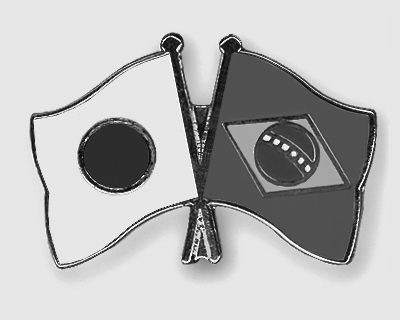Although the stereotypes associated with Japanese and Brazilians are poles apart, the two countries in fact share a special relationship based on the very human ties of historical emigration. Now they are starting to explore the potential of combining the mutual strengths of both nations in the future.
Japan’s is arguably the most “progressed” society on the planet, demographically more mature than any other, and one of the most advanced in terms of technology, infrastructure, healthcare provision and with a massive, capital intensive economy.
In contrast Brasil (spelt the Portuguese on purpose!) has a young demographic, labour-intensive economy destined to grow into a superpower, but lacks many of the technological and infrastructural know-how that Japan has at its fingertips. Today they are becoming ever closer economic partners as they start to realise the potential to trade knowledge, goods and services, and potentially co-create culture too.
In a previous post concerning hybrid families, I came to the conclusion that “new types of humans” may be unique genetically, but it is the fact that they express a unique combination of two cultures that is probably the more interesting characteristic.
Among the possible cultural hybrids you can imagine, the Japan-Brasil hybrid is, for me at least, one of the most interesting to explore, simply because their stereotypical citizens are so contrasting. Personally both Japanese and Brazilian cultures draw me in, but in very different ways, so this is a topic I am bound to come back to repeatedly.
The company I run, Profero Tokyo, is part of an international network that boasts a strong presence in Brasil, and in connection with that I was asked to pull together a factual summary of the special relationship Japan and Brasil enjoy, an abridged version of which you can see below.
(Many thanks to Chris Beaumont for his contributions to this document)
Historical bonds between peoples
- In 1907 a treaty was signed between the Brazilian and Japanese governments to grant the Japanese the right to live and work in Brasil.
- After 19th century emigrations, today Brasil is home to the largest population of Japanese outside of Japan ~ 1.5m
- Japan is home to 320k Brazilians, the largest non-Asian group in the country
- Brasilians perceive a significant role for Japan in Brazil’s development, according to a nationwide survey in 2013 (link – Japanese only):
- “Which country should be the most important partner of Brasil in the future: Japan (50%) came second after the United States (59%), and was followed by China (32%)
- Regarding the fields in which Brazilians have expectations of Japan (multiple answers), transfer of technology (42%) came first, followed by such areas as the expansion of the import of Brazilian products (39%), increase of employment by factory establishments (38%), investment (21%) and the export of Japanese products (21%)
Diplomatic & bilateral agreements
During a meeting between respective foreign ministers in September 2013, the following points were agreed (source link):
- Both welcomed the advances being made in the two countries’ relations not only in political and economic relations, but also in a broad range of areas such as education, science and technology, cooperation in the international arena and culture and sports.
- Both ministers shared the view that 2015, which will be the 120th anniversary of the conclusion of the Treaty of Friendship, Commerce and Navigation between Japan and Brazil, will be celebrated not only by holding a large number of events in both countries, but also by strengthening and deepening bilateral relations further.
- During a meeting between President Rousseff and Prime Minister Abe, Brasil’s President praised the recent investments by Japanese companies in Brasil, welcomed more in the future
- Both premiers looked forward to strengthened cultural ties through future sporting events, as consecutive Olympic host nations, and Japan’s soccer team at Rio2014 (source link)
- A bilateral agreement on sharing Nuclear technology has been restarted having been on hold since the 3/11 earthquake and tsunami (source link)
- In 2013 a waiver of visa requirements has been agreed between the two countries for diplomatic & official passport holders.
Cultural touch points: Soccer
- Soccer has become Japan’s biggest national sport, and there are high hopes for the men’s national team in 2014 after reaching the quarter finals in 2010.
- Soccer is even a topic at summit meetings, as President Rousseff told Priminister Abe that she hoped Brasil would meet Japan in the final of the World Cup!?
- Japan’s women’s soccer team are reigning World champions, helping to expand the appeal and involvement to Japanese women and men alike.
- Japanese consumers are already excited by Brasil’s vibrant culture and the World Cup followed by the Olympics will provide the perfect platform for Brasilian brands to launch broad awareness and acceptance in Japan
Cultural exchange: The arts, entertainment & fashion
- Japan is a voracious consumer of foreign fashion brands, entertainment media and food exports. The culture is extremely dynamic, and brands can rise to prominence here much faster than in other markets.
- An example is the Brasillian flip flop brand “havaianas” that bore the Brazilian flag icon on all its products, which became a sell out success in Japan in recent years
- Perhaps seeded through the Japanese communities in Brasil, the Japanese originated manga (adult comics) and anime (animated TV / film) cultures have become mainstream in Brasil over the last 2 decades. Today Japanese anime song vocalists play to sell out 100k audiences in Brasil, and anime command large TV ratings among young audiences. This has inspired a generation of young Brazilian manga artists and animators, the fruits of which have become major cultural exports for Brasil.
- Brazilian culture is equally popular in Japan. The Asakusa Samba Carnival is one of Tokyo’s biggest summer festivals.
- Japan’s leading social mobile service LINE, today boasts 230m users globally, having broken all records in reaching this number in just 2 years since opening. It’s highly visual and vibrant interface is a natural fit with Brasillian users, and LINE places high priority on Brasil as an international market, and Brasillian portuguese will be one of the first languages to enjoy a localized experience
- Japan’s top EC platform, Rakuten, plans to expand its Brazil operation, opened in 2012, to 1,500 merchants in the 12months from October 2013, and is aiming to grow that number to 20,000 by 2018
Inbound investment from Japan Manufacturing & Technology
- Brasil is seen as a desirable place to invest by Japanese companies. Plans to boost production or acquire a local business in order to build a strong foundation for future growth are regularly announced in Japan.
- Brasil is set to overtake Japan as the world’s third biggest car market, and is the focus of a great deal of investment from Japan’s top 3 makers Toyota, Honda and Nissan:
- In 2011 Japan’s biggest beverage company, Kirin Holdings, took 100% control of Brazil’s second biggest brewer, buying the outstanding 49% of stock for $1.35bn. Now called “Brasil Kirin” the company has 15% market share, and in Nov 2013 Kirin announced a $150m investment plan in 2014 to dramatically increase capacity
- Honda decided in August 2013 to spend ~$450m to build a new assembly plant in Itirapina, Sao Paulo State, doubling its production capacity to 240,000 units / year
- Toyota Motor Corp. in August last year started producing the Etios compact model – tailored to Brasil’s growing car market – at its new factory in Sorocaba, Sao Paulo.
- A Nissan Motor Co. manufacturing facility is under construction in Resende in the state of Rio de Janeiro. Operations are slated to begin in the first half of next year creating 2,000 jobs and 200k units/year in production capacity. See this article for more background on Nissan’s Brazil strategy.
- Japanese business activity is not limited to the auto industry: the Japanese Chamber of Commerce and Industry in Brazil has 354 member companies, the largest number in the group’s history, and they come from a diverse range of sectors.
- An increasing number of presidents running the Brasilian subsidiaries of Japanese companies now double as executive officers of their head offices in Japan, reflecting the strategic importance of Brasil in their international strategies.
- Japan’s leading credit card company, JCB, started issuing credit cards through Caixa in April. JCB already has a network of 1.2m stores in Brasil that accepts its cards.
- Mitsubishi Heavy Industries Ltd. and four other Japanese firms plan to join forces to invest in a Brazilian shipbuilder to better compete with South Korean and Chinese rivals in the lucrative market for resource-exploration vessels, buying a 30% stake in Ecovix-Engevix Construcoes Oceanicas S/A for about 30 billion yen by the end of this fiscal year.
- Technology is also an area of common interest and partnership:
- Telcos will partner to test a global first 8k broadcast system at the Olympics in 2016
- Japan is set to share its megafloat technology to support Brasil’s nascent offshore natural gas extraction opportunities
Trading & Agribusiness
- Japan’s large trading companies are further expanding into Brazil’s agricultural sector. Some companies are trying to boost their transactions with local producers and suppliers through acquisitions of Brazilian operations. Others are engaging in agriculture or handling logistics distribution.
- “We want to contribute to boosting Brazil’s presence as the world’s leading grain supplier,” said Seiji Shiraki, Mitsubishi Corp.’s executive vice president and regional CEO
- Trading company Mitsui & Co. have taken a 49.9% stake in a joint venture with SLC Agricola, targeting international exports and expansion of production to Africa
- Japan’s government has approved the large scale import of Brasilian pork, as of 2013.
Japan’s economic trajectory
- “Abenomics” – the name given to Prime Minister Abe’s didactic economic policies to stimulate economic growth, have so far proved very successful
- Today Japan’s economy is growing faster than any in the developed world, and consumer confidence is higher than at any time over the last decade.
- A cornerstone of Abenomics is to make it easier for international business to operate successfully in Japan, and for their international employees to live comfortably and prosper
- This goal is supported by the establishment of innovation zones in 5 major cities including Tokyo, with deregulation allowing fast establishment & profitable operation


Leave a comment